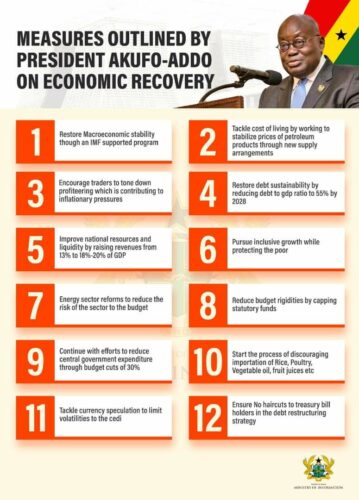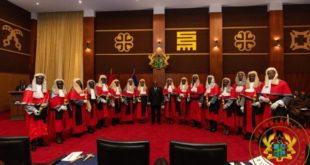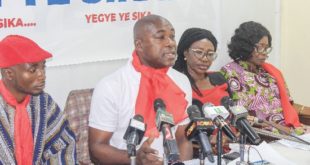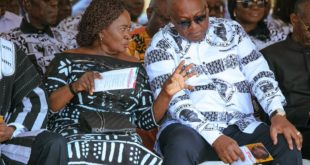According to the Hon. Kwadwo Oppong Nkrumah, Minister of Information, the government has detailed specific initiatives to be done to stabilize the economy by 2028 as part of the measures to return Ghana’s economy to prosperity.
On Monday, October 31,2022, Hon Oppong Nkrumah discussed these measures at the “Nyansapo” breakfast program on Kumasi’s OTEC 102.9 FM hosted by Captain Koda.
To restore and maintain debt sustainability, we propose to lower the present value of our overall public debt to GDP ratio to around 55% by 2028, with the servicing of our external debt set at no more than 18% of our yearly revenue by the same year.
To compete with our contemporaries in the West Africa Region, the government is dedicated to increasing the revenue collection effort from the existing tax-revenue to GDP ratio of thirteen (13%) to between eighteen and twenty per cent (18-20%).
The GRA is implementing a comprehensive package of measures to aid in this improved income mobilization.
We must all assist the GRA in this effort as part of our civic duty.
Within the next three (3) to six (6) years, the government also wants to restore and maintain macroeconomic stability, with a particular emphasis on guaranteeing debt sustainability in order to support long-term, inclusive growth and safeguard the underprivileged.
Read the measures Akufo-Addo outlined below:
1. To restore and sustain debt sustainability, we plan to reduce our total public debt to GDP ratio to some fifty-five per cent (55%) in present value terms by 2028, with the servicing of our external debt pegged at not more than eighteen per cent (18%) of our annual revenue also by 2028.
2. We are committed to improving the revenue collection effort, from the current tax-revenue to GDP ratio of thirteen (13%) to between eighteen and twenty per cent (18-20%), to be competitive with our peers in the West Africa Region. The GRA is rolling out an extensive set of measures to support this enhanced revenue mobilisation. All of us must do our patriotic duty and support the GRA in this exercise.
3. We are aiming to restore and sustain macroeconomic stability within the next three (3) to six (6) years, with a focus on ensuring debt sustainability to promote durable and inclusive growth while protecting the poor.
4. We have decided to review the reforms in the energy sector, capping of statutory funds, implementation of the exemptions Act and a new property rate regime. We have decided also to continue with the policy of thirty percent (30%) cut in the salaries of political office holders including the President, Vice President, Ministers, Deputy Ministers, MMDCEs, and SOE appointees in 2023, just as we will continue with the thirty percent (30%) cut in discretionary expenditures of Ministries, Departments and Agencies.
5. we will review the standards required for imports into the country, prioritise the imports, as well as review the management of our foreign exchange reserves, in relation to imports of products such as rice, poultry, vegetable oil, tooth picks, pasta, fruit juice, bottled water and ceramic tiles, and others which, with intensified government support and that of the banking sector, can be manufactured and produced in sufficient quantities in Ghana.
6. We must, as a matter of urgent national security, reduce our dependence on imported goods, and enhance our self-reliance, as demanded by our overarching goal of creating a Ghana Beyond Aid.
7. We must work to ensure that the majority of goods in our shops and market places are those we produce and grow here in Ghana. That is why we have to support our farmers and domestic industries, including those created under the 1-District-1-Factory initiative, to help reduce our dependence on imports, and allow us the opportunity to export more and more of our products, and guarantee a stable currency that will present a high level of predictability for citizens and the business community. Exports, not imports, must be our mantra! Accra, after all, hosts the headquarters of the Secretariat of the African Continental Free Trade Area.
8. Enhanced supervisory action by the Bank of Ghana in the forex bureau markets and the black market to flush out illegal operators, as well as ensuring that those permitted to operate legally abide by the market rules. Already some forex bureaus have had their licenses revoked, and this exercise will continue until complete order is restored in the sector;
9. Fresh inflows of dollars are providing liquidity to the foreign exchange market and addressing the pipeline demand;
10. The Bank of Ghana has given its full commitment to the commercial banks to provide liquidity to ensure the wheels of the economy continue to run in a stabilised manner till the IMF Programme kicks in and the financing assurances expected from other partners also come in;
11. Government is working with the Bank of Ghana and the oil-producing and mining companies to introduce a new legal and regulatory framework to ensure that all foreign exchange earned from operations in Ghana is initially paid to banks domiciled in Ghana to help boost the domestic foreign exchange market; and
12. The Bank of Ghana will enhance its gold purchase programme.

Source: Ghanatodayonline.com
 Ghanatodayonline.com News, Politics, Health, Education & More
Ghanatodayonline.com News, Politics, Health, Education & More



